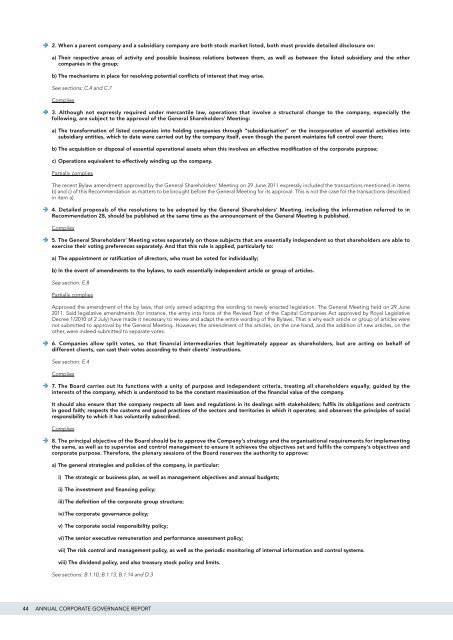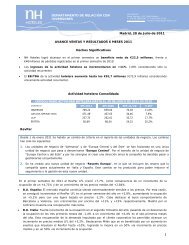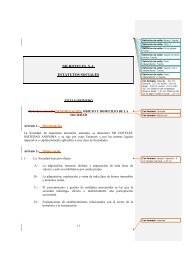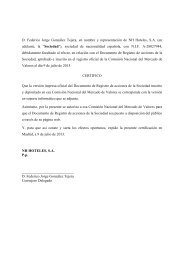Consolidated Financial Statements and Consolidated Management ...
Consolidated Financial Statements and Consolidated Management ...
Consolidated Financial Statements and Consolidated Management ...
You also want an ePaper? Increase the reach of your titles
YUMPU automatically turns print PDFs into web optimized ePapers that Google loves.
2. When a parent company <strong>and</strong> a subsidiary company are both stock market listed, both must provide detailed disclosure on:<br />
a) Their respective areas of activity <strong>and</strong> possible business relations between them, as well as between the listed subsidiary <strong>and</strong> the other<br />
companies in the group;<br />
b) The mechanisms in place for resolving potential conflicts of interest that may arise.<br />
See sections: C.4 <strong>and</strong> C.7<br />
Complies<br />
3. Although not expressly required under mercantile law, operations that involve a structural change to the company, especially the<br />
following, are subject to the approval of the General Shareholders’ Meeting:<br />
a) The transformation of listed companies into holding companies through “subsidiarisation” or the incorporation of essential activities into<br />
subsidiary entities, which to date were carried out by the company itself, even though the parent maintains full control over them;<br />
b) The acquisition or disposal of essential operational assets when this involves an effective modification of the corporate purpose;<br />
c) Operations equivalent to effectively winding up the company.<br />
Partially complies<br />
The recent Bylaw amendment approved by the General Shareholders’ Meeting on 29 June 2011 expressly included the transactions mentioned in items<br />
b) <strong>and</strong> c) of this Recommendation as matters to be brought before the General Meeting for its approval. This is not the case for the transactions described<br />
in item a).<br />
4. Detailed proposals of the resolutions to be adopted by the General Shareholders’ Meeting, including the information referred to in<br />
Recommendation 28, should be published at the same time as the announcement of the General Meeting is published.<br />
Complies<br />
5. The General Shareholders’ Meeting votes separately on those subjects that are essentially independent so that shareholders are able to<br />
exercise their voting preferences separately. And that this rule is applied, particularly to:<br />
a) The appointment or ratification of directors, who must be voted for individually;<br />
b) In the event of amendments to the bylaws, to each essentially independent article or group of articles.<br />
See section: E.8<br />
Partially complies<br />
Approved the amendment of the by laws, that only aimed adapting the wording to newly enacted legislation. The General Meeting held on 29 June<br />
2011. Said legislative amendments (for instance, the entry into force of the Revised Text of the Capital Companies Act approved by Royal Legislative<br />
Decree 1/2010 of 2 July) have made it necessary to review <strong>and</strong> adapt the entire wording of the Bylaws. That is why each article or group of articles were<br />
not submitted to approval by the General Meeting. However, the amendment of the articles, on the one h<strong>and</strong>, <strong>and</strong> the addition of new articles, on the<br />
other, were indeed submitted to separate votes.<br />
6. Companies allow split votes, so that financial intermediaries that legitimately appear as shareholders, but are acting on behalf of<br />
different clients, can cast their votes according to their clients’ instructions.<br />
See section: E.4<br />
Complies<br />
7. The Board carries out its functions with a unity of purpose <strong>and</strong> independent criteria, treating all shareholders equally, guided by the<br />
interests of the company, which is understood to be the constant maximisation of the financial value of the company.<br />
It should also ensure that the company respects all laws <strong>and</strong> regulations in its dealings with stakeholders; fulfils its obligations <strong>and</strong> contracts<br />
in good faith; respects the customs <strong>and</strong> good practices of the sectors <strong>and</strong> territories in which it operates; <strong>and</strong> observes the principles of social<br />
responsibility to which it has voluntarily subscribed.<br />
Complies<br />
8. The principal objective of the Board should be to approve the Company’s strategy <strong>and</strong> the organisational requirements for implementing<br />
the same, as well as to supervise <strong>and</strong> control management to ensure it achieves the objectives set <strong>and</strong> fulfils the company’s objectives <strong>and</strong><br />
corporate purpose. Therefore, the plenary sessions of the Board reserves the authority to approve:<br />
a) The general strategies <strong>and</strong> policies of the company, in particular:<br />
i) The strategic or business plan, as well as management objectives <strong>and</strong> annual budgets;<br />
ii) The investment <strong>and</strong> financing policy;<br />
iii) The definition of the corporate group structure;<br />
iv) The corporate governance policy;<br />
v) The corporate social responsibility policy;<br />
vi) The senior executive remuneration <strong>and</strong> performance assessment policy;<br />
vii) The risk control <strong>and</strong> management policy, as well as the periodic monitoring of internal information <strong>and</strong> control systems.<br />
viii) The dividend policy, <strong>and</strong> also treasury stock policy <strong>and</strong> limits.<br />
See sections: B.1.10, B.1.13, B.1.14 <strong>and</strong> D.3<br />
44<br />
ANNUAL CORPORATE GOVERNANCE REPORT
















